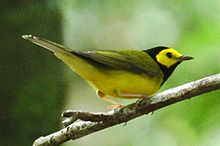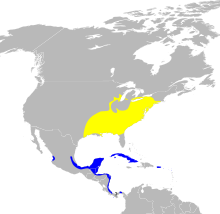Hooded warbler
| Hooded warbler | |
|---|---|
 |
|
| Adult male | |
| Scientific classification | |
| Kingdom: | Animalia |
| Phylum: | Chordata |
| Class: | Aves |
| Order: | Passeriformes |
| Family: | Parulidae |
| Genus: | Setophaga |
| Species: | S. citrina |
| Binomial name | |
|
Setophaga citrina (Boddaert, 1783) |
|
 |
|
| Range of S. citrina Breeding range Wintering range | |
| Synonyms | |
|
Wilsonia citrina |
|
Wilsonia citrina
Dendroica citrina
The hooded warbler (Setophaga citrina) is a New World warbler. It breeds in eastern North America and across the eastern United States and into southernmost Canada, (Ontario). It is migratory, wintering in Central America and the West Indies. Hooded warblers are very rare vagrants to western Europe.
Recent genetic research has suggested that the type species of Wilsonia (hooded warbler W. citrina) and of Setophaga (American redstart S. ruticilla) are closely related and should be merged into the same genus. As the name Setophaga (published in 1827) takes priority over Wilsonia (published in 1838), hooded warbler would then be transferred as Setophaga citrina. This change has been accepted by the North American Classification Committee of the American Ornithologists' Union, and the IOC World Bird List. The South American Classification Committee continues to list the bird in the genus Wilsonia.
The genus name Setophaga is from Ancient Greek ses, "moth", and phagos, "eating", and the specific citrina is Latin for citrine.
The hooded warbler is a small bird and mid-sized warbler, measuring 13 cm (5.1 in) in length and weighing 9–12 g (0.32–0.42 oz). It has a plain olive/green-brown back, and yellow underparts. Their outer rectrices have whitish vanes. Males have distinctive black hoods which surround their yellow faces; the female has an olive-green cap which does not extend to the forehead, ears and throat instead. Males attain their hood at about 9–12 months of age; younger birds are essentially identical to (and easily confused with) females. The song is a series of musical notes which sound like: wheeta wheeta whee-tee-oh, for which a common mnemonic is "The red, the red T-shirt" or "Come to the woods or you won't see me". The call of these birds is a loud chip.
...
Wikipedia

